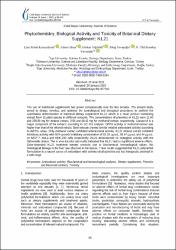Phytochemistry, Biological Activity and Toxicity of Botanical Dietary Supplement: KL21

Göster/
Tarih
2022Yazar
Kösal Karayıldırım, ÇinelGüner, Adem
Yiğittürk, Adem
Yavaşoğlu, Altuğ
Yavaşoğlu Karabay, N. Ülkü
Üst veri
Tüm öğe kaydını gösterKünye
KARAYILDIRIM ÇİNEL KÖKSAL,GÜNER Adem,YİĞİTTÜRK Gürkan,YAVAŞOĞLU Altuğ,KARABAY Ülkü Phytochemistry, Biological Activity and Toxicity of Botanical Dietary Supplement: KL21. Celal Bayar Üniversitesi Fen Bilimleri Dergisi, vol.18, no.1, 2022, ss.95 - 105. Doi: 10.18466/cbayarfbe.957203Özet
The use of nutritional supplements has grown conspicuously over the last decades. The present study aimed to design, develop, and optimize the toxicological and biological procedures to perform the quantitative determination of botanical dietary supplement KL21. The concentrations of phenolics in KL21 were 11.90 and 258.58 mg for ethanol, 3.58 and 86.42 mg for methanol extract, respectively. Carvacrol is a major component of the extracts according to GC-MS analysis. DPPH activity of methanol extract was higher than that of the ethanol extract. Both extracts showed similar relative antioxidant activity according to ABTS+ assay. Only methanol extract exhibited antimicrobial activity. KL21 ethanol extract exhibited inhibitory activity with 50 % growth inhibitory concentration of 92.09, 95.47 and 44 μg/mL on MCF-7, HeLa and HEK-293 cells respectively. KL21 demonstrated no mutagenic activity with the Salmonella strains. The in vivo toxicity test results indicated that KL21 had no significant adverse effects. Dose-depended KL21 treatment seemed nontoxic due to biochemical, hematological values. No histological damage in the liver was observed in the tissues. These results suggested that KL21 polyherbal formulation is a naturel source of antioxidant with antimicrobial activities and has therapeutic potential in a safe range.

















